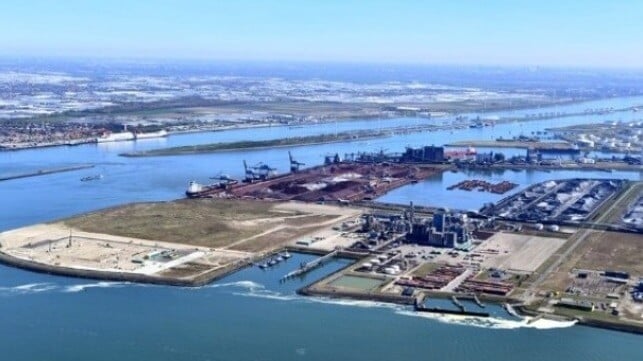Five European Ports Join with Maersk Center to Launch Green Corridor

Five Northern European port authorities announced that they are joining in partnership with the Mærsk Mc-Kinney Møller Center for Zero Carbon Shipping to lay the foundations for a green corridor serving Northern Europe and the Baltic. The concept which was presented at COP-26 in Glasgow in November 2021 calls for cooperation between ports, shipping lines, and others to incentivize routes that would support the development of net-zero propulsion technology and the infrastructure required for the transition to green fuels.
The Mærsk Mc-Kinney Møller Center for Zero Carbon Shipping said that it will kickstart this ambitious initiative with the port authorities of Gdynia, Hamburg, Roenne, Rotterdam, and Tallinn. The project is designed to demonstrate the early commercialization of alternative fuel supply chains and provide a roadmap to scaling the supply chains and create a blueprint for rolling out green corridors in other locations.
“This is a vital step towards accelerating the decarbonization of the shipping industry and meeting the EU’s 2030 climate ambitions,” said Bo Cerup-Simonsen, CEO of the center. “Developing green corridors are instrumental in activating industry first-movers across the value chain, and this project can be used as industry references to develop blueprints for new business models and identify the maritime industry’s interdependencies. We hope this project will also help facilitate the important work with maritime standards at the EU and IMO.”
To establish the foundation for a new European Green Corridors Network the partner plan to start pre-feasibility work by identifying the potential routes, vessel types, and fuels to establish high-impact green corridors in the region. Once they have completed the first phase, they will assess the technical, regulatory, and commercial feasibility of the shortlisted routes moving to implement their vision and establish green corridors in Northern Europe and the Baltic Sea.
“Until recently, the maritime sector was the only transport sector in the EU not subject to greenhouse gas emission reduction targets,” explains Valdo Kalm, CEO of Port of Tallinn. “We must all work together to reduce CO2 emissions. To achieve maritime sector decarbonization, zero-emission fuels and vessels must be deployed at scale over the next decade. It is undoubtedly a difficult task, but it can be aided by the formation of green corridors in which major ports provide the necessary zero-carbon fuels at the required scale for bunkering.”
To accelerate the development of viable technologies, the leaders of the ports agree that a coordinated effort within applied research is needed across the entire supply chain. They are committed to working with the center to lead in the fulfillment of the objectives defined at COP-26 and further advance green corridors. During the conference, Germany and the Netherlands said they were already working on establishing a green corridor for inland shipping while each of the ports is pursuing its own green plans. They look to work together in the new initiative looks to advance the effort to deep-sea shipping in the region and will look for additional public and private stakeholders to join the European project as it progresses.

that matters most
Get the latest maritime news delivered to your inbox daily.
“It’s essential that shipping lines take the initiative to decarbonize their businesses, and that the ports assist them, for instance by making sure the right bunker infrastructure and regulations are in place in time,” said Allard Castelein, CEO of the Port of Rotterdam Authority.
The Northern Europe project follows an announcement of a partnership of cities, ports, shipping companies, and cargo owners to create the first-of-its-kind green shipping corridor between Shanghai and Los Angeles. The project, which includes shipping majors Maersk, CMA CGM, and COSCO Shipping Lines, calls for a plan by the end of 2022 and beginning the transition to zero-carbon fueled ships by 2030 for commercial shipping on one of the busiest ocean shipping routes in the world.
